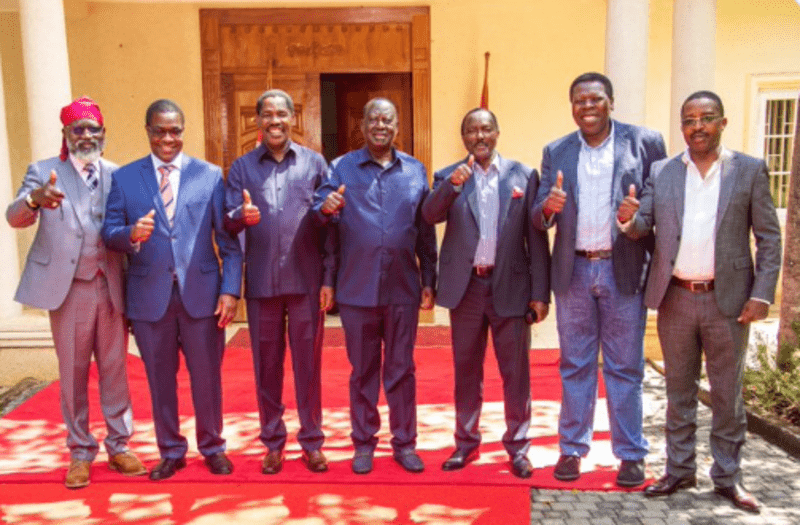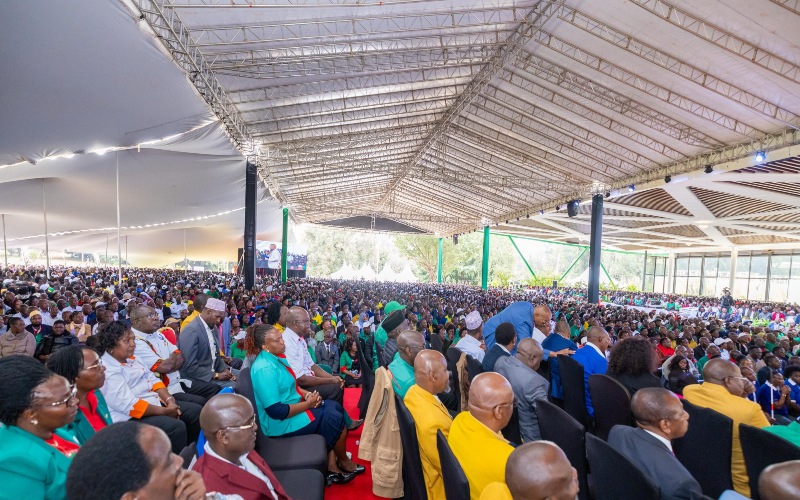Political parties to disclose coalition agreements to Parliament within 15 days in new proposal

Currently, political parties must submit their coalition agreements to the RPP either before or after elections.
5A new Bill that would require the Registrar of Political Parties (RPP) to inform Parliament about any coalition agreements made by political parties is set to be debated by Members of Parliament.
The Political Parties (Amendment) Bill 2022, introduced by Uasin Gishu Woman Representative Gladys Shollei, proposes that the RPP must send a certified copy of these agreements to Parliament within 15 days of receiving them.
More To Read
- Nyamira Governor Amos Nyaribo pleads not guilty to impeachment charges before Senate
- Impeachment storm hits Nairobi as MCAs collect signatures to oust Governor Sakaja, deputy Muchiri
- Senate showdown as Kericho Governor Erick Mutai faces impeachment trial
- Embattled Kericho Governor Erick Mutai challenges impeachment, cites manipulated vote
- Defiant Sifuna attacks Ruto again, accuses him of undermining devolution
- Kingi warns Isiolo governor to rebuild trust, not celebrate, after Senate impeachment reprieve
Coalition agreements are formal arrangements made between two or more political parties to collaborate in governance or during elections. These agreements outline shared goals, defining common objectives, policies, and priorities that the parties aim to pursue together.
They specify how power and responsibilities will be distributed among the parties, including positions in government, committees, and leadership roles. Additionally, these agreements may include plans for joint campaigning, candidate selection, and strategies for securing votes.
Currently, political parties must submit their coalition agreements to the RPP either before or after elections, as these agreements are important for determining which parties hold majority or minority status in Parliament.
If passed, the RPP will be mandated to indicate the date on which each coalition agreement was submitted when conveying it to Parliament.
“The registrar shall, within 15 days of receipt of a coalition agreement deposited in his or her office, convey a certified copy of the agreement to the Clerk of each House of Parliament,” reads the Bill.
This refers to both the National Assembly and the Senate.
The Bill is currently under consideration in the National Assembly. It aims to implement recommendations from the 12th Parliament, which were adopted in the fifth report of the National Assembly's Committee on Procedure and House Rules.
The Political Parties Act allows two or more political parties to form a coalition or a coalition political party, either before or after an election. These coalitions must file their agreements with the RPP, with a pre-election agreement requiring submission at least three months before the election, while post-election agreements must be filed within 21 days of signing.
In the case of a coalition political party, the agreement must be deposited at least 120 days before a general election.
 Roots party boss George Wajackoyah, and Azimio members including National Assembly Minority Leader Opiyo Wandayi, PNU Party Leader Peter Munya, Azimio leader Raila Odinga, Wiper boss Kalonzo Musyoka, DAPK Party Leader Eugine Wamalwa, and former Murang'a Governor Mwangi Wa Iria. (Photo: X/Azimio)
Roots party boss George Wajackoyah, and Azimio members including National Assembly Minority Leader Opiyo Wandayi, PNU Party Leader Peter Munya, Azimio leader Raila Odinga, Wiper boss Kalonzo Musyoka, DAPK Party Leader Eugine Wamalwa, and former Murang'a Governor Mwangi Wa Iria. (Photo: X/Azimio)Roots party boss George Wajackoyah, and Azimio members including National Assembly Minority Leader Opiyo Wandayi, PNU Party Leader Peter Munya, Azimio leader Raila Odinga, Wiper boss Kalonzo Musyoka, DAPK Party Leader Eugine Wamalwa and former Murang'a Governor Mwangi Wa Iria. (Photo: X/Azimio)
Standing Order 2B of the National Assembly currently requires the Clerk of the House to obtain a certified copy of any coalition agreement involving two or more parties. This is to ascertain the relative majorities in the House and ensure smooth operations.
However, Shollei asserts that this provision is insufficient, especially given the disputes between the Azimio and Kenya Kwanza coalitions following the 2022 General Election, where opposition chief Raila Odinga filed a petition seeking to overturn the presidential results. These disputes ultimately led to National Assembly Speaker Moses Wetang'ula having to intervene to establish the majority coalition.
"The registrar shall, within seven days of the commencement of this Act, convey a certified copy of any coalition agreement entered into and deposited with the registrar before the requirement came into force," reads the Bill.
Shollei argues that the presence of coalition agreements in Parliament would help determine entitlements, such as majority and minority leadership positions, their deputies, majority whips, and committee distributions, which are all based on the number of MPs each coalition commands in the Houses of Parliament.
The coalition or party with the highest number of MPs in the National Assembly and the Senate is entitled to majority leadership positions and committee memberships, while the second-largest coalition or party takes the minority leadership roles and occupies fewer committee seats.
Parliamentary Standing Orders dictate that the majority coalition chairs departmental committees in the National Assembly, while the minority coalition heads watchdog committees like the Public Accounts Committee (PAC), Public Investments Committee (PIC), and the Committee on Implementation (CoI).
The Senate's minority coalition similarly chairs key oversight committees, including the County Public Accounts Committee (CPAC) and the County Public Investments and Special Funds Committee (CPIC&SFC).
In his October 6, 2022 ruling, Speaker Wetang'ula confirmed that Kenya Kwanza was the majority coalition in the National Assembly with 179 MPs, while Azimio became the minority coalition with 157 MPs.
Standing Order 19A also stipulates that when electing majority and minority leaders, parties must consider existing coalition agreements and gender balance. Once elected, the party whips are required to communicate the results to the Speaker, who will then notify the House.
This Bill, if passed, will introduce a new layer of transparency and clarity around coalition agreements, particularly in light of disputes regarding majority status in the House.
Top Stories Today














































